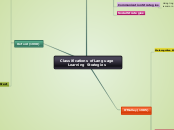Classifications of Language Learning Strategies
Oxford (1990)
Direct
Memory
Creating mental linkages
Applying images and sounds
Reviewing well
Employing actions
Cognitive
Practising
Receiving and sending messages
Analysing and reasoning
Creating structure for input and output
Compensation
Guessing intelligently
Overcoming limitations in speaking and writing
Indirect
Metacognitive
Overviewing and linking with known material
Paying attention
Delaying speech production
Organising
Setting goals and objectives
Planning language task
Self monitoring
Self evaluating
Grabbing opportunities for language practice
Affective
Lowering anxiety
Encouraging oneself
Taking emotional temperature
Social
Asking questions
Co-operating with others
empathizing with others
Rubin (1987)
Learning strategies
Cognitive Learning Strategies
Clarification/ Verification
Guessing/ Inductive Inferencing
Deductive Reasoning
Practice
Memorisation
Monitoring
Metacognitive Learning Strategies
Planning
Prioritising
Setting goals
Self-management
Communication Strategies
Using linguistic or communicative knowledge to remain in conversation
Social Strategies
O'Malley (1985)
Metacognitive Strategies
advance organizers
directed attention
selective attention
self-management
functional planning
self-monitoring
delayed production
self-evaluation
Cognitive Strategies
Repetition
Resourcing
Translation
Grouping
Note taking
Deduction
Recombination
Imagery
Auditory representation
Key word
Contextualisation
Elaboratin
Transfer
Inferencing
Socio-affective strategies
Co-operating
Questioning/Requesting Clarification
